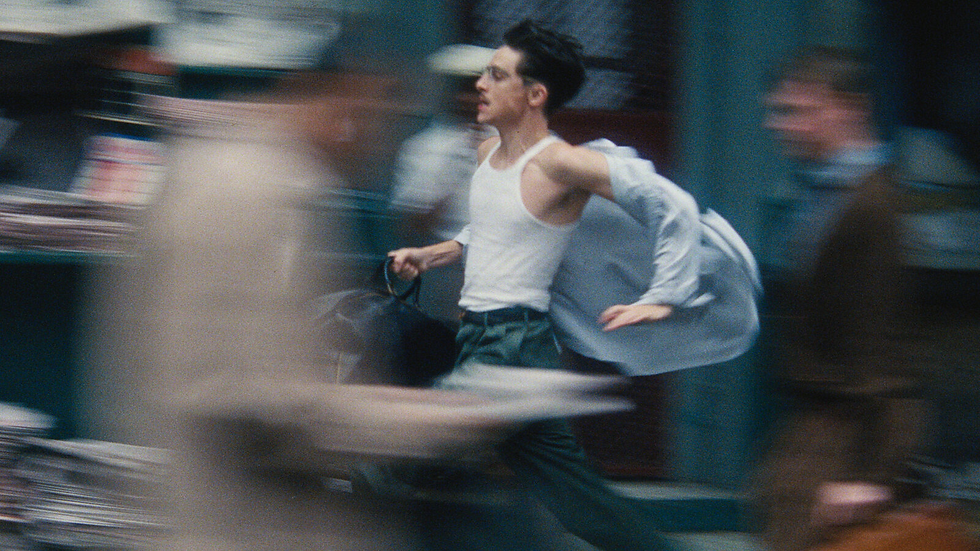"Blue Moon's" Linklater-less Script Leaves Audience Demanding More
- Eric Hardman

- Sep 4, 2025
- 3 min read
And just like that, the 50th Toronto International Film Festival takes off on King Street in Canada's most populous city. Despite just starting today, 2025 is expected to be one of the best years in the festival's history due to a star-studded slate filled with some of the biggest names in film. One of the most shining examples of this is Richard Linklater's new film, Blue Moon, premiering only four months after the director's last film, Nouvelle Vague, which is also screening at TIFF this year. So with two dueling Linklater films at the festival this year, audiences are wondering which one will come out on top. But let me tell you, it's certainly not Blue Moon...

Over the course of his career, Richard Linklater has become one of the West's most beloved filmmakers. From the iconic Before Trilogy, to Boyhood, to Dazed and Confused, all of these films are bursting with love and personality, united by a common thread: Richard Linklater either co-wrote, or solo wrote all of them. His newest collaboration with legend Ethan Hawke, keeps the pulpy monologues, but ditches Linklater in the writer’s role, and replaces him with novelist Robert Krapow. This flip flop is immediately apparent, as the often romantic nature of Linklater is strangely replaced with cynicism, more confined spaces, and a neurotic performance from Ethan Hawke that's more reminiscent Tom Hanks in Elvis than it likely was anticipating.
The film is just under 100 minutes long, and there is likely only 5 of those minutes where Ethan Hawke is not talking in some capacity. In a lot of ways his performance is incredibly committed and admirable, but the hilariously noticeable bald cap and the cartoonish facial/vocal quirks he exhibits in every scene brought more focus to my eyes than anything else. Other cast members in the film do a fine job, but the one that I find myself thinking about the most is Andrew Scott. His take on Richard Rodgers is subdued, passive aggressive, and rightfully largely disconnected from the rest of the crew.
Films that mostly take place in one location often have a difficult time keeping things visually interesting. There are notable exceptions, but this is the first Linklater film I’ve seen where it genuinely seemed as if he ran out of things to do with the camera. This results in some truly bizarre cutting and angle changes that disrupt the pace of the scene, and often expose glaring moments of ADR or performance inconsistency.
Another choice that definitely did not have the intended effect on me was making Hawke’s portrayal of Lorenz Hart have historically accurate height. Hart had dwarfism in real life, which makes the choice understandable, but the visual effect work done to shrink Hawke to a smaller size is almost unintentionally laughable. There is one shot in particular where Hawke is standing atop a step and stretches out his arms that genuinely resembles the compressed image meme of Keanu Reeves.

That’s not to say that the screenplay is entirely lackluster. The dialogue, while often largely repetitive, is still rife with wit, and nearly every scene ends with a callback button line of dialogue. Unfortunately, I found myself feeling far more cynical about the state of the world than the film likely wanted me to, given the way the end cards deliver the future information. A lot of this felt as if Linklater, Hawke and Krapow used this opportunity to personally air out their own grievances with modern day art, and their place in it through the lens of Lorenz Hart. While the experiment is certainly an interesting one, it’s one that did not entirely stick the landing for me.
There is a moment very early on in the film where Ethan Hawke begins ranting to Bobby Canavale’s character about the first time he saw Oklahoma! He describes his somewhat negative opinion of the show, and how he found himself wanting to grab the audience by the neck and say “For the love of God, demand more!” This sentiment was not dissimilar to the way I felt throughout this. Nothing about it offended me in any way, but the lack of Linklater in the writer’s room accompanied by too tight of a setting and Ethan Hawke going too over the top for my liking, Blue Moon left me with a bit more sour of a taste in my mouth than I was hoping for.



